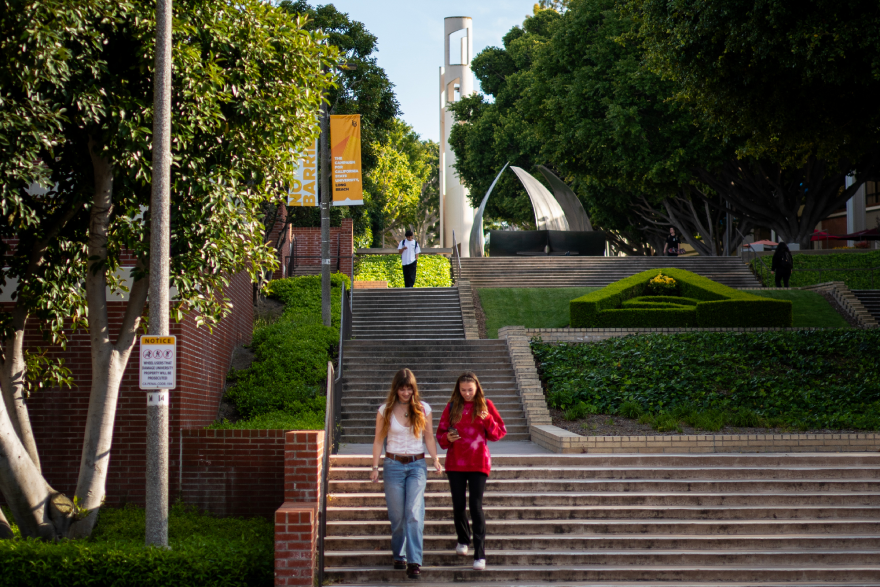More than a year after stinging audits, hearings with state Legislators and outcry from students and faculty calling for change, Cal State University is moving closer to meeting requirements from the state to reform how it handles reports of sexual discrimination, harassment and assault at its 23 campuses.
The Cal State Board of Trustees responded positively to a progress report given during its meeting this week by officials in the Chancellor’s Office tasked with overhauling the university system’s Title IX procedures. Reforms underway include internal audits of five campuses each semester, collecting data for an annual report, and hiring civil rights attorneys to handle cases more efficiently.
The calls for systemwide change followed a review by the Cozen O’ Connor law firm hired by Cal State to investigate how its central office and 23 campuses managed Title IX cases of gender and sex discrimination. In May 2023, the firm found that Cal State must make campus environments safer and hire more employees dedicated to addressing these cases appropriately, as many were mishandled.
The California State Auditor released an audit in July 2023 reaffirming that Cal State inadequately addressed issues of sexual harassment and discrimination and stipulating 16 actions to fix the broken system. Through AB 1790, approved in July this year, Cal State is compelled to implement those recommendations by July 1, 2026. So far, 10 have been completed and two are nearly complete. One of those is an annual report that the university system must give to the state Legislature by Dec. 1, per SB 808.
It will take all of us working together to change the culture.
Recently, Chancellor Mildred Garcia spoke at a hearing Aug. 14 before the Joint Legislative Audit Committee, the Assembly Higher Education Committee and the Senate Education Committee, where she announced that $15.9 million had been invested across the CSU and within the Chancellor’s Office to bolster civil rights programs and services for the 2024-25 academic year.
At the Cal State Board of Trustees meeting Wednesday, the Title IX progress report also included a briefing on how the systemwide Civil Rights Office will train the staff on using trauma-informed practices. Presenters also announced a new steering committee that will bring together representatives from all areas of the universities where employees and students might go for support, to make sure they are directed to the right resources and don’t fall through the cracks.
“We must keep our focus on how students and employees engage with our processes. To do this well, we must do a better job of holistically supporting them and directing them for where to go for support,” said Hayley Schwarzkopf, the associate vice chancellor for civil rights programs and services. “It will take all of us working together to change the culture.”
Several board members thanked Schwarzkopf for the progress her office has made since the last board meeting in July.
“I want to thank you for this report,” Trustee Douglas Faigin said. “It’s very impressive, and the new focus on victims, the focus on people is very gratifying. Thank you for doing this.”
Timeliness and trauma
Cal Poly Pomona women’s basketball Coach Danelle Bishop needed action after experiencing discrimination and retaliation on the job. So she did what employees and students are supposed to do: She called the Title IX office at her university. However, she found an under-resourced and overworked staff.
So Bishop made another call, this time to the California State University Board of Trustees during the public comment portion of its meeting this week.
“I learned that the CSU’s Title IX system is broken,” Bishop told the board. “We deserve a safe and healthy workplace free from abuse, harassment and bullying.”
It’s just traumatizing in ways that I’ve never had to deal with in my life.
Despite the efforts by Cal State to reform its Title IX offices, individuals such as Bishop who have sought support have been stuck in the waiting game.
Bishop did not want to give details about her experience of discrimination at Cal Poly Pomona due to privacy concerns, however she shared with CalMatters that her situation arose in Spring 2023. She reached out to the Title IX office and did meet with staff a couple of times, but nothing has changed. They did email her links to Cal Poly Pomona’s Human Resources Operations and an Employee Assistance Program.
“It’s just traumatizing in ways that I’ve never had to deal with in my life,” Bishop said. “I’m going through it right now, and I know, I know there’s going to be a day that, you know, things are going to get better, but it’s been, it’s been a long year and a half, very long year and a half, almost two years.”
In response to a question from Trustee Diego Arambula about timeliness with Title IX cases, Shwarzkopf answered that there needs to be a balance with expediency and a trauma-informed approach.
She explained that a trauma-informed approach is a practice for civil rights professionals to support individuals with sensitivity.
“Sometimes, you know, a student or an employee will engage with our civil rights office, and they’re unsure if they want to proceed,” Schwarzkopf said. “That takes time and conversations, but you [Arambula] are absolutely correct that once that decision is made, we have to move forward expeditiously on our university campuses.”
In addition to the $15.9 million funding sent to campuses for their civil rights offices, Schwarzkopf added that the Chancellor’s Office will ensure that systemwide directors and civil rights attorneys are expediting Title IX cases.
Spotlight on campuses and annual surveys
The five dedicated systemwide directors and five civil rights attorneys hired by Cal State will be in charge of obtaining and publicizing data through regular compliance reviews of civil rights offices at each CSU campus every three years as well as an annual report survey.
The five campuses that will be reviewed first, this fall, are: Chico State, Cal State Maritime, Cal State Bakersfield, Cal Poly Pomona and Cal State Long Beach. During spring 2025, another five campuses will be reviewed, and so on.
Once the review for each campus is complete, the systemwide director will meet with the campus president, the campus council, the civil rights attorney and other individuals the campus president would like to be there to outline the areas of strength and growth for the selected university.
Information from the compliance reviews will be aggregated into a public report.
Bishop, whose campus will be one of the first universities to be reviewed, would like for her issue to be properly researched by the Title IX office at Cal Poly Pomona.
“I would like to see every issue that I bring up actually be researched,” Bishop said. “Instead, I was told their job is only to notify whoever they need to notify on campus, and they’re not required to research or look into every issue.”
I feel like everyone should feel safe in the college they go to.
Despite each Cal State campus reforming its Title IX processes, some students at Cal Poly Pomona are unaware that the university has an office tasked with assisting students and employees who have experienced sexual assault, discrimination or harassment.
Bernadette Venegas, a third year psychology student at Cal Poly Pomona, had no idea there was a Title IX office at her campus, but is troubled to hear that the system is not working for many.
“It sucks that there is not a good system that people can feel safe and supported by so that if something ever does happen to them they may not feel they have the support that they need,” Venegas said. “I feel like everyone should feel safe in the college they go to.”
Another recommendation the state auditor made is conducting a Systemwide Annual Report Survey. The 2023-24 survey will include standardized data from the number of cases reported, case types, timeliness of completion, patterns and trends from all of Cal State’s 23 campuses.
“The CSU has not previously ensured that information was collected in a consistent manner through efforts and standardized reporting, written guidance, training and ongoing support,” Schwarzkopf said. “The CSU system will be better able to more accurately obtain and transparently report this information.”
Due to the lack of consistent and comprehensive data throughout the university system, the data produced by the annual survey will act as a baseline for a unified case management system.
The Chancellor’s Office is expected to receive the results from the survey Oct. 1 and will present the data to the state Legislature Dec. 1.
“Eventually, we’ll have a case management system,” said Interim Vice Chancellor for Human Resources Albert Liddicoat, “which will give us the ability to track from all those different offices that are entering incidents related to a student or comments that were made that might triangulate onto something that’s happening more broadly, and then it needs to be proactively addressed.”
Victoria Mejicanos contributed to this story. Mercy Sosa and Victoria Mejicanos are fellows with the College Journalism Network, a collaboration between CalMatters and student journalists from across California. CalMatters higher education coverage is supported by a grant from the College Futures Foundation.







